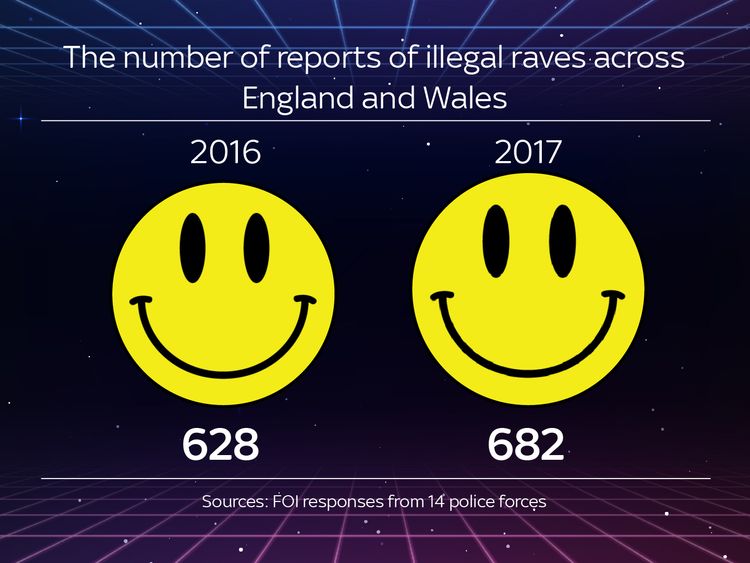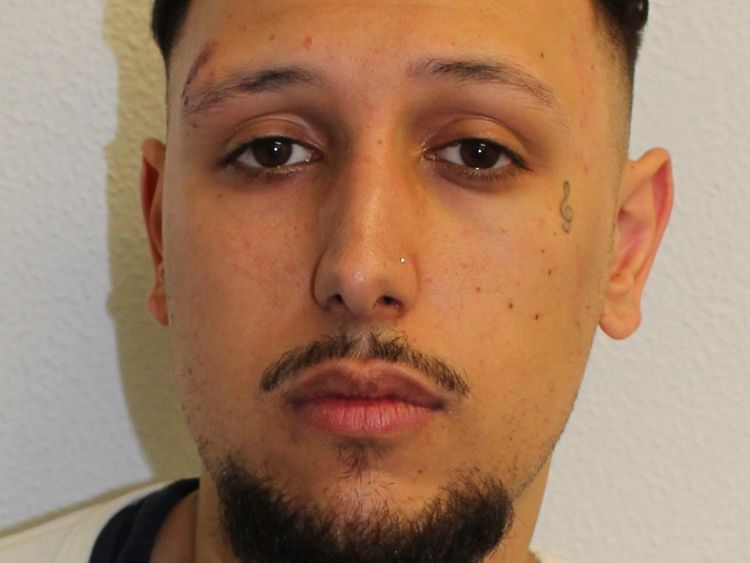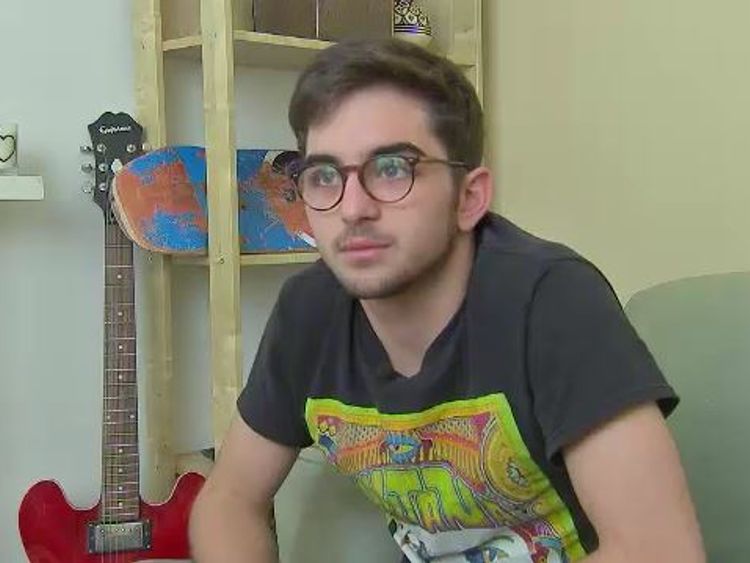Police warn of 'growing' illegal rave problem as numbers soar
More than 680 reports of unlicensed music events were recorded last year – up 9% on the previous 12 months – amid a rise in nightclubs shutting down, a Sky News investigation has found.
The National Police Chiefs’ Council (NPCC) said illegal raves were “inherently unsafe” and officers had to consider the safety of residents when deciding whether to shut events down.
It comes after police faced criticism for failing to stop a massive illegal rave in the Welsh village of Brechfa, which reportedly attracted more than 1,000 people in May.
Caroline Evans, who lived near the illegal rave site, said police failed to act quickly enough to stop the event growing.
She told Sky News: “There was a lot of mess – human faeces, drug bags, cans and bottles all over the floor. By the time the police arrived, it was already well-established.
“The rave was reported to police in the early hours but officers didn’t get to the main junction where people were parking their cars until the next afternoon.”
Sky News asked each of the UK’s 45 territorial police forces for the number of illegal raves reported in the last three years.
Just 14 forces in England and Wales provided annual figures, meaning the actual number of illegal raves is likely to be much higher.
Overall, the number of reports of illegal raves rose to 682 in 2017, compared with 628 in 2016.
In London, the Metropolitan Police said there were 133 unlicensed music events in 2017 – nearly double the 70 recorded the previous year.
In one case this year, Jordan Gharib, 26, was jailed for 21 months for violent disorder after several police officers were injured at an illegal rave in Barking, east London, in June.
Devon and Cornwall, South Yorkshire, Gwent, Cambridgeshire, West Midlands and Northamptonshire were among the other forces to record illegal raves in their areas.
Separately, Merseyside Police said it recorded 108 crime incidents related to raves, including complaints about noise and anti-social behaviour, between 2015 and April 2018.
Chief constable Ben-Julian Harrington, the NPCC’s lead for sporting and planned events, told Sky News: “It is clear that unlicensed music events are a growing problem and they pose a real challenge to communities and police forces.
“Unlike licensed events, unlicensed music events are inherently unsafe. They lack safety provisions such as stewarding, security, fire regulation and medical support while regularly attracting a large number of people who cause damage and disturbance.
“Forces must balance the nuisance or damage caused with the overall safety of the local community, those attending and the police officers or other agencies who may need to respond.”
DJ and student Stephane Massa, who regularly attends unlicensed music events in London, said he “hates being made to feel like a criminal”.
“People may think that because there is no police or security that it goes wild but it really isn’t like that,” he told Sky News.
“I think people are actually quite discreet and respectful. Most people genuinely don’t have any intention to harm anyone or their surroundings.
“Obviously there are some people who push the boundaries – but that is the same in every nightclub in the country.
“A lot of the time the only problem is people not picking up litter after themselves.”
The increase in illegal raves comes as the number of nightclubs in London fell by 8% between 2014 and 2017, according to figures from data firm CGA.
Meanwhile, the number of nightclubs across the rest of Britain – outside of the capital – dropped 6% from 2012 to 2017, CGA said.
Kate Nicholls, chief executive of UK Hospitality, which represents clubs and restaurants, said “excessive and intrusive” licensing controls had put “huge pressures on businesses”.
She said: “If nightclubs are being squeezed and forced to close or increase their prices, then customers will naturally gravitate towards the alternatives that come in the form of illegal raves.
“The reasons behind an increase in the number of illegal raves may be complex, but this worrying trend is only going to be made worse if more nightclubs become unprofitable or inaccessible.”
Jeremy Abbott, digital editor at dance music magazine Mixmag, said the increasing popularity of illegal raves was a “worrying trend”.
He said: “Clubs are more expensive than ever, the same goes for drinks prices in clubs. On the flip-side, it’s worryingly easy to get your hands on drugs in London alone and the strength of ecstasy has sky-rocketed.
“It’s an easy alternative to clubbing in the city and with many venues being shutdown it’s a popular alternative.
“It’s a worrying trend as of course these parties can’t be properly policed or regulated so crime and risk of drug-related illness is higher.”
Source: Read Full Article





